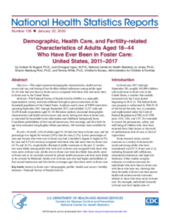Displaying 801 - 810 of 2495
The current study provides a more nuanced account of foster youth with disabilities’ transitions into adulthood.
This study examined the impact of health care education materials designed for foster youth, called ICare2CHECK. It was hypothesized that ICare2CHECK would increase nonurgent ambulatory health care use and decrease emergency/urgent care use.
This study used variations in the adoption and refund status of state-level Earned Income Tax Credit (EITC), a socioeconomic policy intended to reduce poverty, to examine their effect on foster care entry rates in the U.S.
This study examined the outcomes of a training aimed at enhancing child welfare practitioners’ use of data from the the Ontario Looking After Children (OnLAC) project for service planning related to young people’s educational outcomes.
Nine parents who had been deported from the U.S. while their children (and other family members) remained in the country have been returned to the U.S. to be reunited with their children, according to this article from CBS News.
In this paper, the authors examined if high socio-economic status (SES) of families had an effect on youth’s adjustment by comparing 226 internationally adopted female Chinese youth who experienced pre-adoption institutionalization with 1059 non-adopted Chinese peers living in China, as well as 209 non-adopted American peers.
This report presents demographic characteristics, health service access and use, and timing of key fertility-related milestones among adults aged 18–44 who had ever been in foster care as compared with those who had never been in foster care in the United States.
This article from the Associated Press reviews some key findings from a recent analysis on foster care outcomes, compiled by researchers from the U.S. National Center for Health Statistics and the Department of Health and Human Services’ Children’s Bureau.
This study examined how foster parents worked together to parent foster children, how they described their roles and involvement with their foster children, how fostering impacted their coparenting and couple relationship, and their experiences and needs of working together with and within the foster care system.
The purpose of the study was to evaluate the associations between child maltreatment, cognitive schemas of disconnection/rejection reported in emerging adulthood, and social support perceived in emerging adulthood among young women who have exited placements in residential care.

